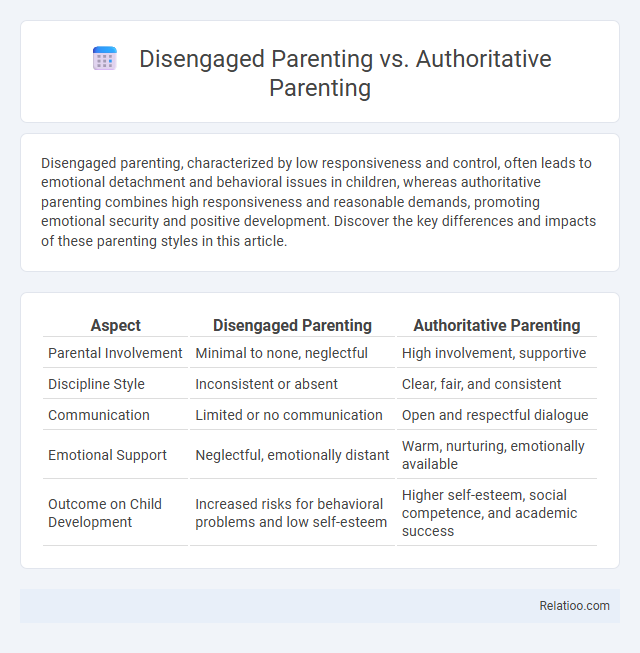Disengaged parenting, characterized by low responsiveness and control, often leads to emotional detachment and behavioral issues in children, whereas authoritative parenting combines high responsiveness and reasonable demands, promoting emotional security and positive development. Discover the key differences and impacts of these parenting styles in this article.
Table of Comparison
| Aspect | Disengaged Parenting | Authoritative Parenting |
|---|---|---|
| Parental Involvement | Minimal to none, neglectful | High involvement, supportive |
| Discipline Style | Inconsistent or absent | Clear, fair, and consistent |
| Communication | Limited or no communication | Open and respectful dialogue |
| Emotional Support | Neglectful, emotionally distant | Warm, nurturing, emotionally available |
| Outcome on Child Development | Increased risks for behavioral problems and low self-esteem | Higher self-esteem, social competence, and academic success |
Understanding Disengaged Parenting
Disengaged parenting is characterized by low responsiveness and low demandingness, where parents provide minimal emotional support and supervision, often leading to feelings of neglect in children. This style contrasts with authoritative parenting, which balances high responsiveness with appropriate demands, promoting healthy development and self-regulation. Understanding disengaged parenting is crucial for recognizing its impact on your child's emotional well-being and behavioral outcomes.
Core Characteristics of Authoritative Parenting
Authoritative parenting is characterized by high responsiveness and high demands, balancing warmth and structure to promote positive child development. This style involves setting clear expectations while encouraging open communication and independence, fostering self-discipline and social competence in children. Unlike disengaged parenting, which shows low responsiveness and low demands, or authoritarian parenting, which is high in demands but low in responsiveness, authoritative parenting consistently supports emotional support alongside firm guidance.
Emotional Effects on Children
Disengaged parenting often leads to emotional neglect, resulting in children experiencing feelings of insecurity, low self-esteem, and difficulty forming healthy relationships. Authoritative parenting fosters emotional stability by combining warmth and discipline, enhancing children's self-confidence, social competence, and resilience. In contrast, authoritarian parenting may cause increased anxiety, low self-worth, and emotional withdrawal due to its rigid and punitive nature.
Impact on Academic Performance
Authoritative parenting, characterized by high responsiveness and reasonable demands, significantly enhances your child's academic performance by fostering self-discipline and motivation. Disengaged parenting, marked by low responsiveness and low demands, often leads to poor academic outcomes due to lack of support and supervision. Compared to permissive parenting, authoritative approaches provide clearer structure and expectations, resulting in better academic achievement and emotional regulation.
Communication Styles Compared
Disengaged parenting features minimal communication, often leading to feelings of neglect and emotional distance in children. Authoritative parenting balances clear, open communication with warmth and responsiveness, fostering trust and mutual respect. Your child's social skills and emotional development benefit significantly from the consistent dialogue and support characteristic of authoritative communication styles.
Discipline and Boundaries
Disengaged parenting is characterized by low responsiveness and low demands, resulting in minimal discipline and unclear boundaries that often leave children without guidance. Authoritative parenting balances firm discipline with warmth and clear expectations, fostering structured boundaries that help children develop self-regulation and responsibility. Your child benefits most from authoritative parenting, where consistent discipline and defined limits create a supportive environment for growth and emotional security.
Long-term Behavioral Outcomes
Disengaged parenting typically leads to poor long-term behavioral outcomes such as increased risk of substance abuse, academic failure, and social withdrawal due to lack of supervision and emotional support. Authoritative parenting, characterized by high responsiveness and reasonable demands, fosters positive long-term behaviors including strong self-regulation, social competence, and academic success. Your child is more likely to develop resilience and healthy emotional regulation under authoritative parenting compared to disengaged or authoritarian styles.
Parent-Child Relationship Quality
Disengaged parenting is characterized by low responsiveness and low demands, often resulting in poor parent-child relationship quality marked by emotional detachment and limited communication. Authoritative parenting balances high responsiveness with reasonable demands, fostering strong relationship quality through open communication, warmth, and mutual respect. Compared to disengaged and authoritarian styles, authoritative parenting consistently correlates with positive child outcomes and healthier emotional bonds.
Building Healthy Family Dynamics
Disengaged parenting often leads to emotional detachment and a lack of guidance, which can hinder your child's development of trust and security. Authoritative parenting balances firm boundaries with warmth and responsiveness, fostering healthy communication and emotional growth within the family. Prioritizing authoritative strategies enhances family dynamics by promoting mutual respect, accountability, and supportive relationships.
Choosing the Best Parenting Approach
Choosing the best parenting approach involves understanding the distinct impacts of disengaged, authoritative, and authoritarian parenting styles on your child's development. Authoritative parenting, characterized by warmth, structure, and clear communication, consistently promotes higher self-esteem, academic success, and emotional regulation compared to disengaged parenting, which often leads to behavioral issues and poor social skills. Prioritizing an authoritative approach helps you foster a supportive environment that balances independence with guidance, optimizing your child's long-term well-being.

Infographic: Disengaged parenting vs Authoritative parenting
 relatioo.com
relatioo.com